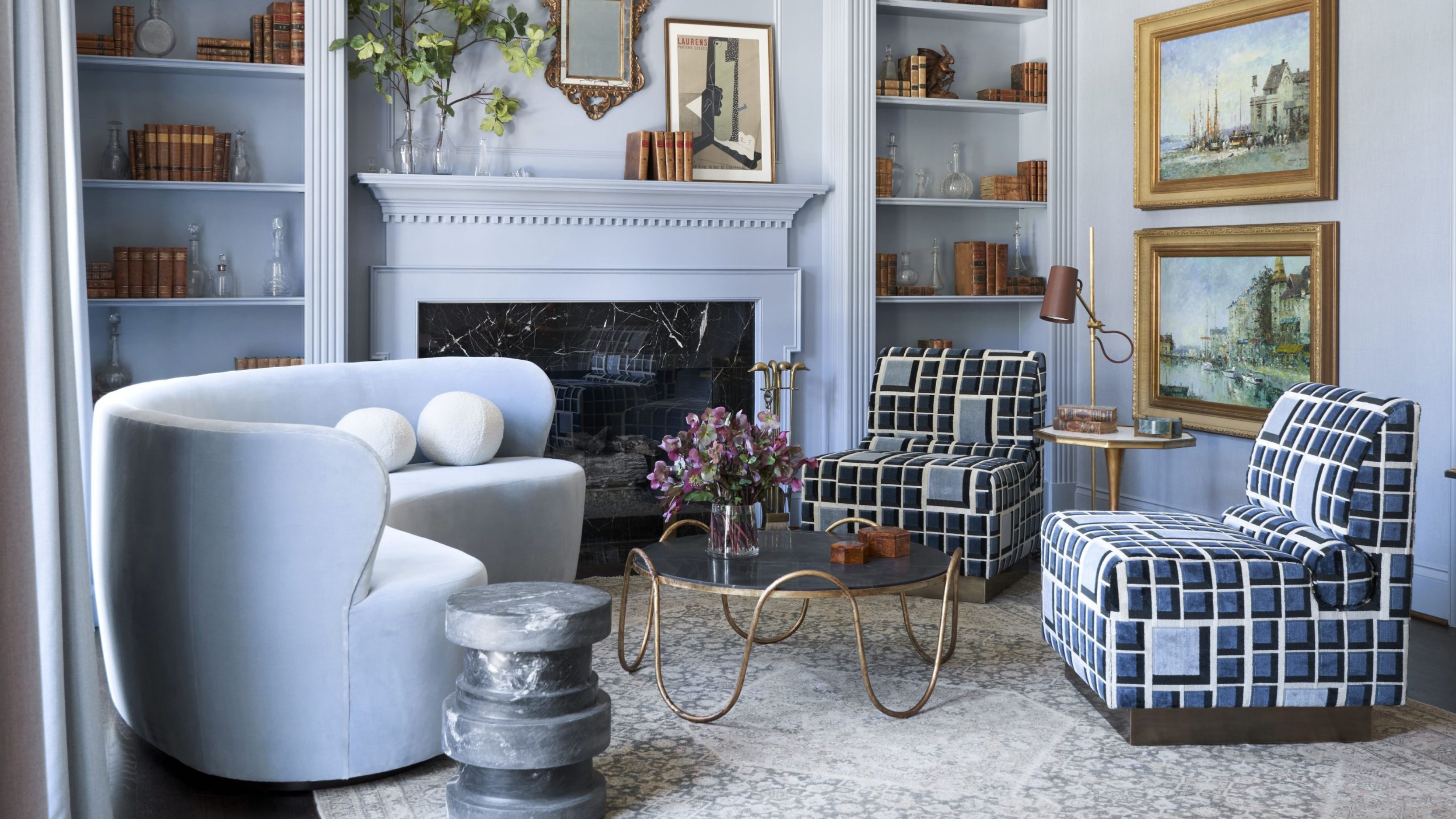
How do you officially measure when something has crossed that threshold between trendy and timeless? Whatever it is, curved sofa living room ideas have surely done it. They've wrapped their way around our living spaces (and homes more generally) for years now, and show no signs of slowing.
The fact they've lingered in the design zeitgeist for so long should come as no surprise, either, as we continue to seek out styles that embrace a softer, squishier aesthetic. And it's not just the way they look, but how they can make a room feel.
"Curved sofas create an open and inclusive ambiance in a living room, offering a welcoming and harmonious design element that invites conversation and connection," explains interior designer Marina Hirsch.
Some of the best sofas feature curved silhouettes, with top designers continuing to turn to them for their projects. "The best part about choosing a curved sofa is how easily they float in a space," says Tara Marshall of Fort Architecture.
If you're looking for ideas on how to incorporate this style into your space, we've shared 12 curved sofa living room ideas below, along with advice from those in the know on how to position and pair them in the room. Here's what is worth knowing.
12 Curved Sofa Living Room Ideas
1. Create an enveloping intimacy with a curved sofa
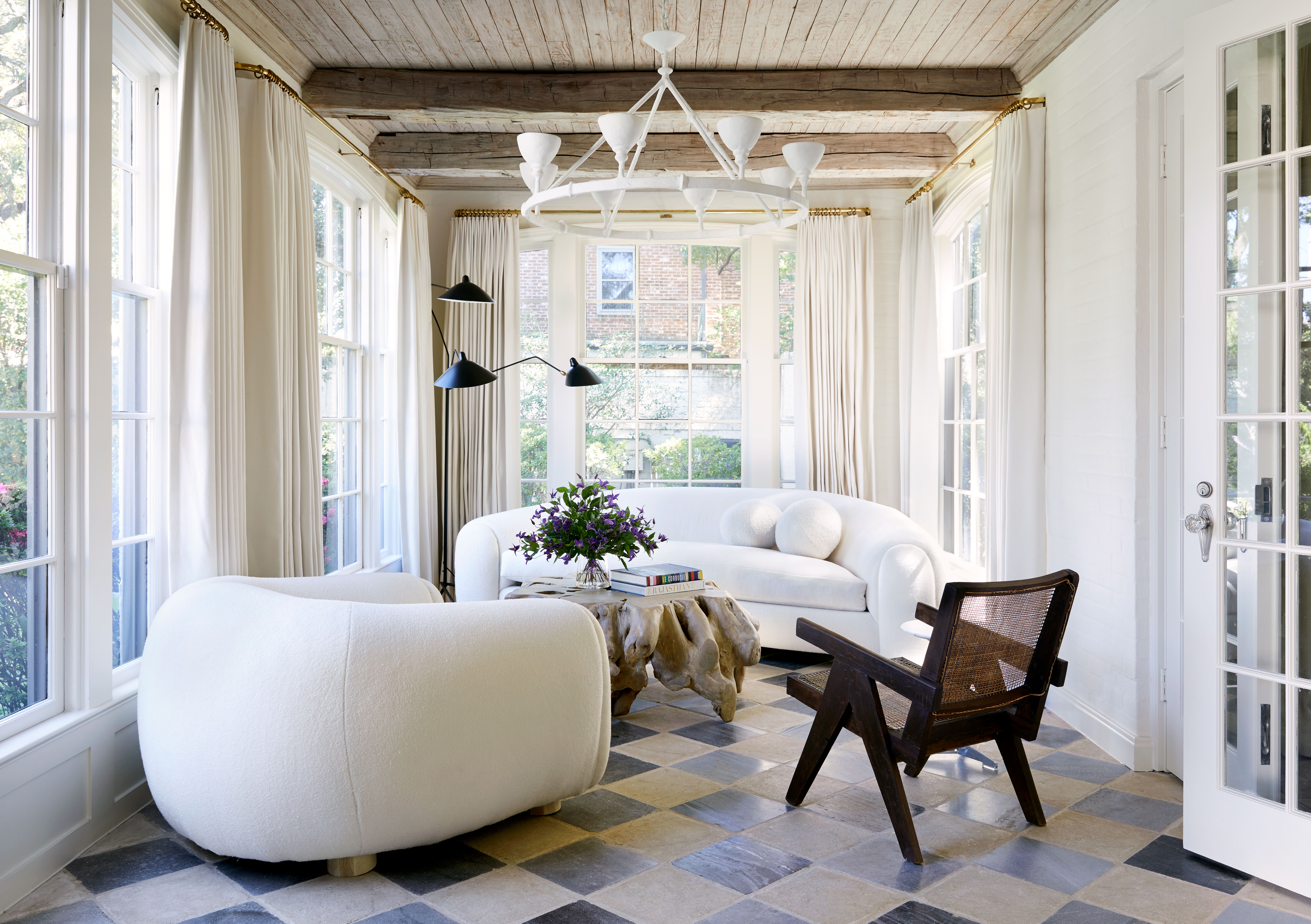
While often reserved for spacious, open-concept rooms, curved sofas can also be a clever way to create more intentional intimacy in smaller spaces, too. This sunroom, by interior designer Meg Lonergan, was intended as a space for one or two people to curl up with a book, rather than for entertaining.
"The curved sofas play a key role by creating a more relaxed, lounge-like atmosphere," the designer explains. "They also bring people together, inviting them to sit closer to one another. Although you can typically fit fewer people on them because of their shape, curved sofas are perfect for snuggling up with knees touching. They are a form of intimate seating."
2. Pair a curved design with other rounded shapes
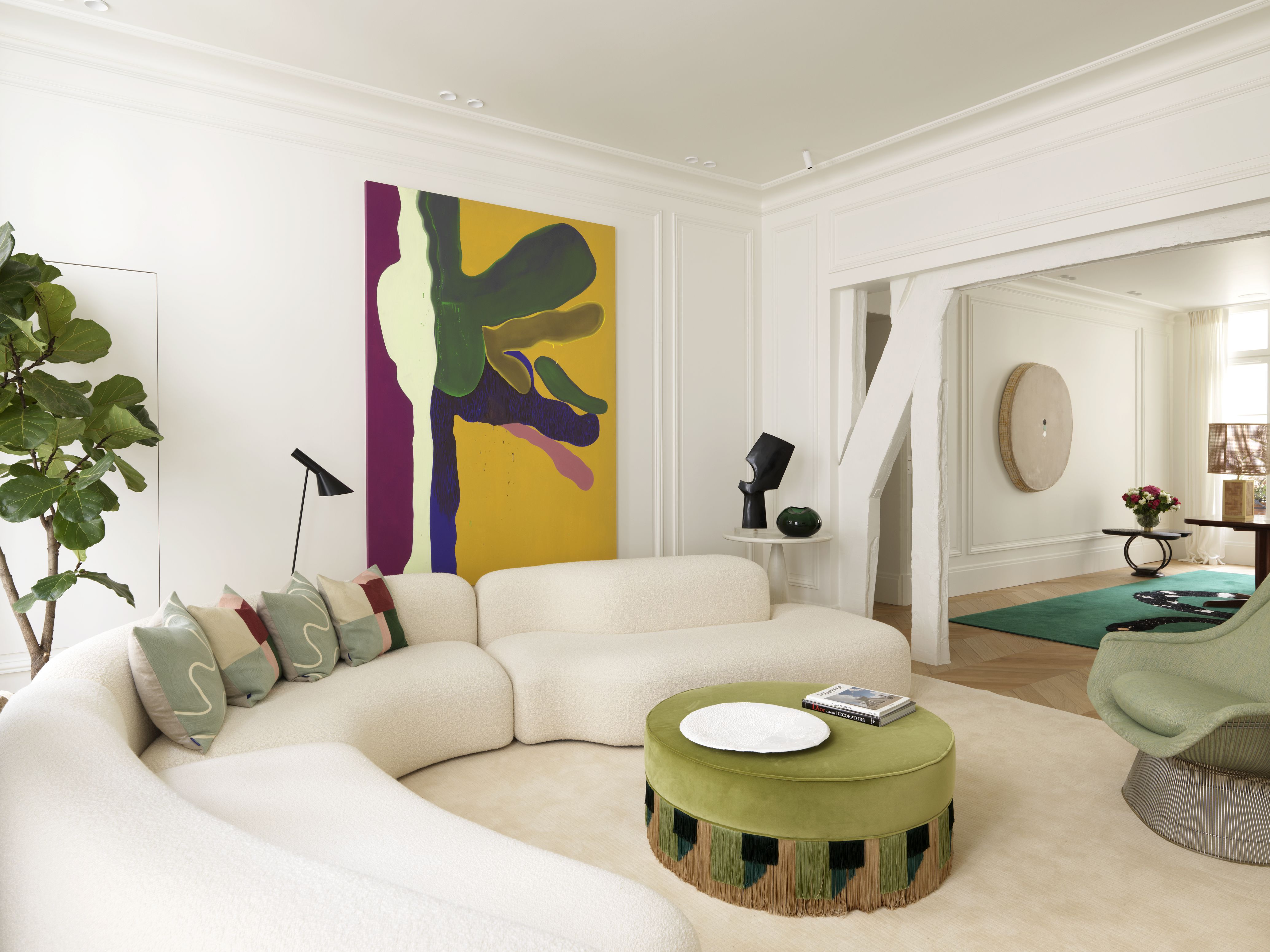
There's hardly a hard line to be found in this Paris apartment — a collaboration between designers Stéphan Bidoux and Julien Villeneuve — bar the beamed threshold that separates this chic living room from a home office.
"The shape of a curved sofa is softer and less formal," explains Julien, who says this elegant white modular sofa, upholstered in a cosy wool bouclé, was designed as a bespoke piece for the project. "This kind of sofa also drives you to choose other round pieces, like the coffee table or the lounge chairs in this room." Note how even the artwork mirrors the same organic shapes — this is a sofa trend that sets the agenda for the whole rest of the scheme.
There's something to be said for supersizing, too. "The idea was to create an enveloping environment where all the family can sit together," he adds.
3. Utilize the dead space behind a curved sofa
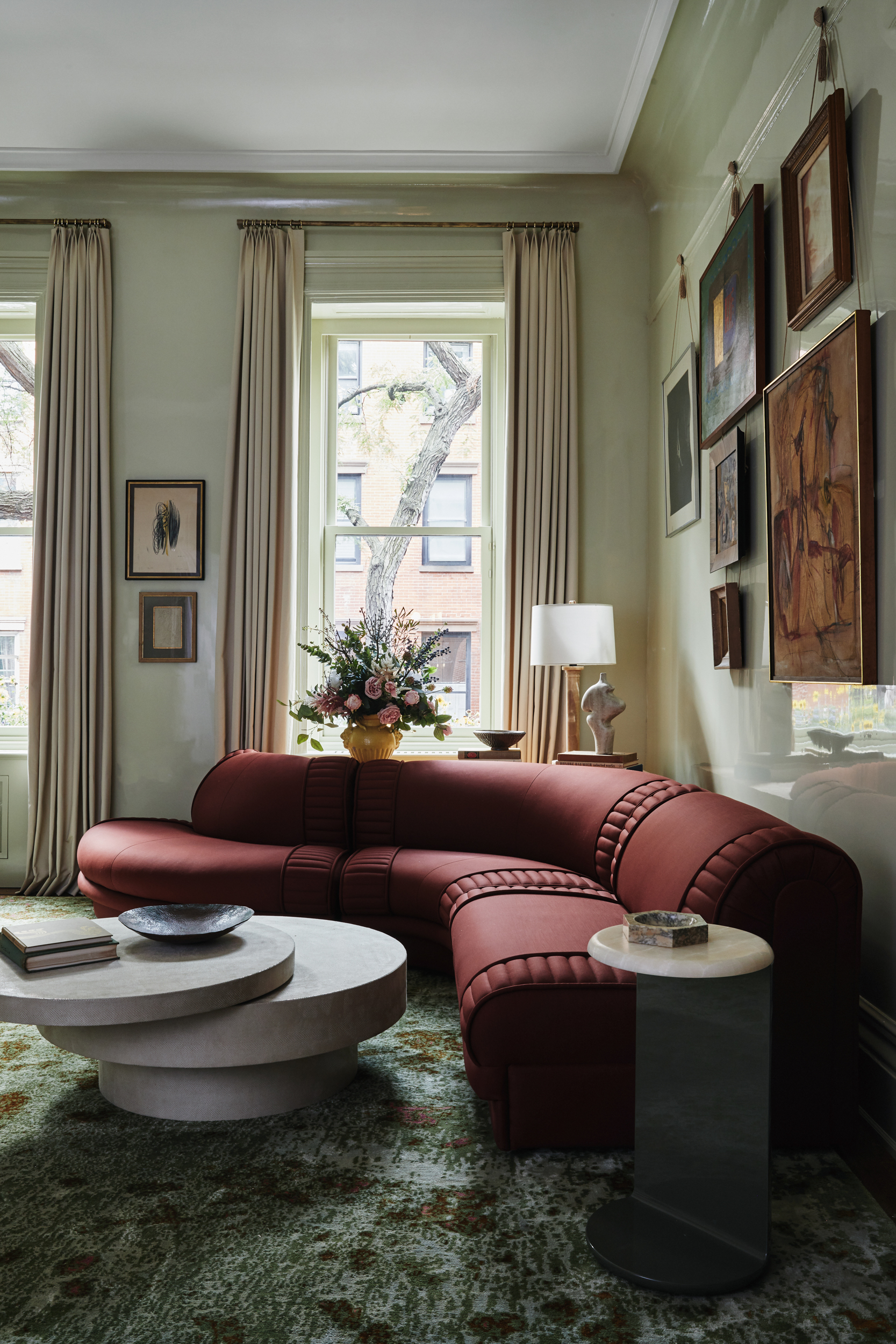
A curved sofa living room idea is a smart solution for townhouses, which have long, rectangular rooms that are "notoriously tricky to furnish" says Jenna Chused, the founder of New York interior design firm Chused & Co. "In this particular room, we also had the extra challenge of an off-centered fireplace and a doorway that landed into the front seating area. This gorgeous serpentine sofa turned up in an auction, and I grabbed it."
Clocking the newly-created gap at the back, she came up with a way to free up precious mug-and-magazine space on the side and coffee table. "I designed a custom curved table to fit perfectly behind and hug the sofa's curves, which allowed me to place lighting behind the sofa and created an area that felt more considered as I pushed the sofa back into the corner. The result is a more inviting open seating area that felt welcoming and sat twice as many people as a standard sofa."
4. Play up an organic aesthetic
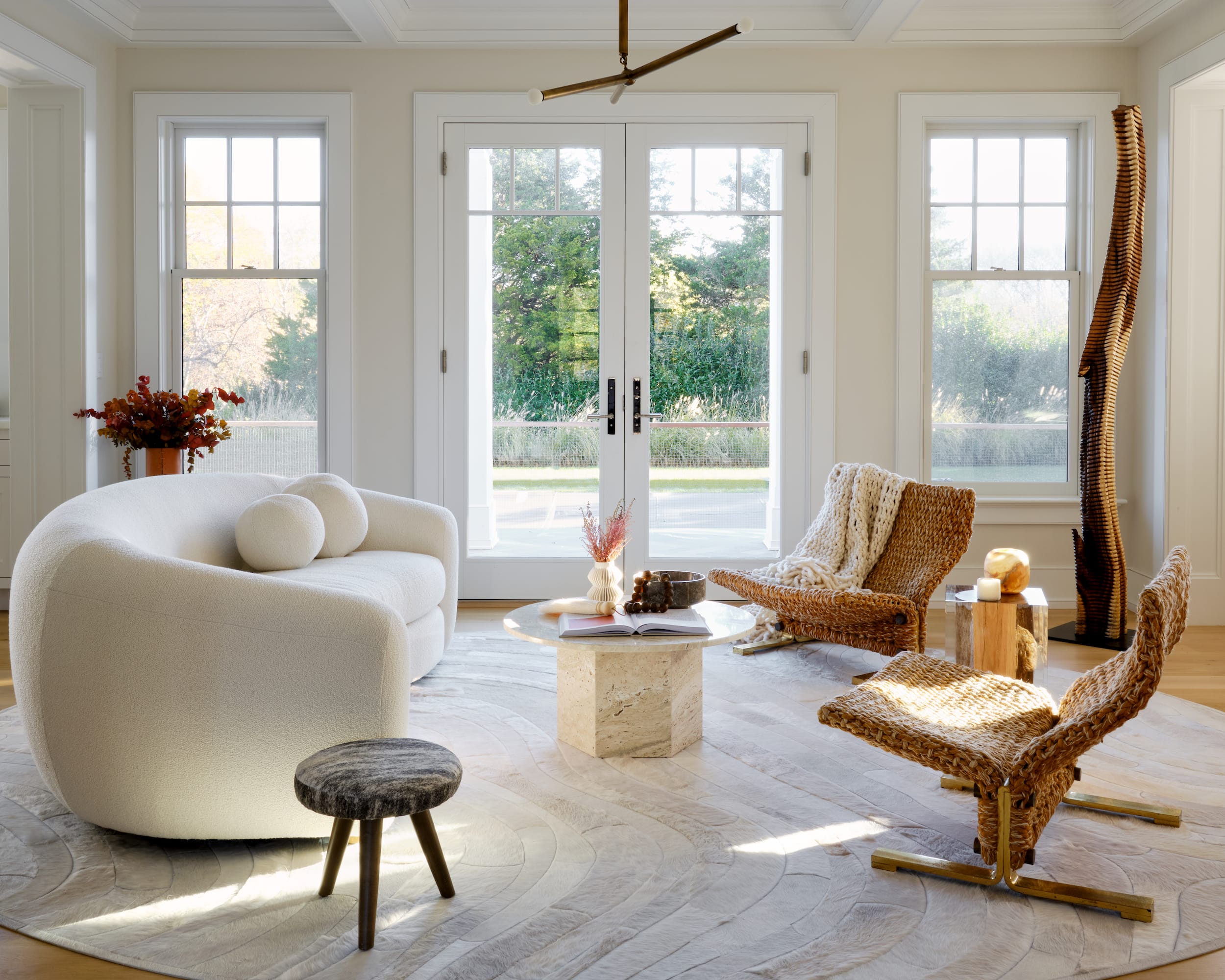
Bulbous furniture feels inherently organic when you're comparing curved sofas vs straight sofas. That's exactly the reason why designer Marina Hanisch, founder of Greenwich, Connecticut-based Marina Hanisch Interiors, chose to include one in this pared-back living space.
"I chose this curved sofa for this living room to introduce a sense of softness and organic flow into the space," she explains. "The sofa’s curves contrast the angular lines of the room’s interior architecture and echo the organic shapes and natural materials seen in the arrangement’s woven chairs and sculptural elements."
But it's not just its shape that helps achieve that aesthetic, but how Marina chose to float the furniture in the room. "Positioned centrally, the sofa establishes an inviting gathering area, while its luxe texture and neutral tone add warmth and understated elegance," Marina continues. "Ultimately, I think it ties the living room together beautifully and enhances the calm, harmonious atmosphere we were looking for."
5. Soften compact spaces with a sweeping curve
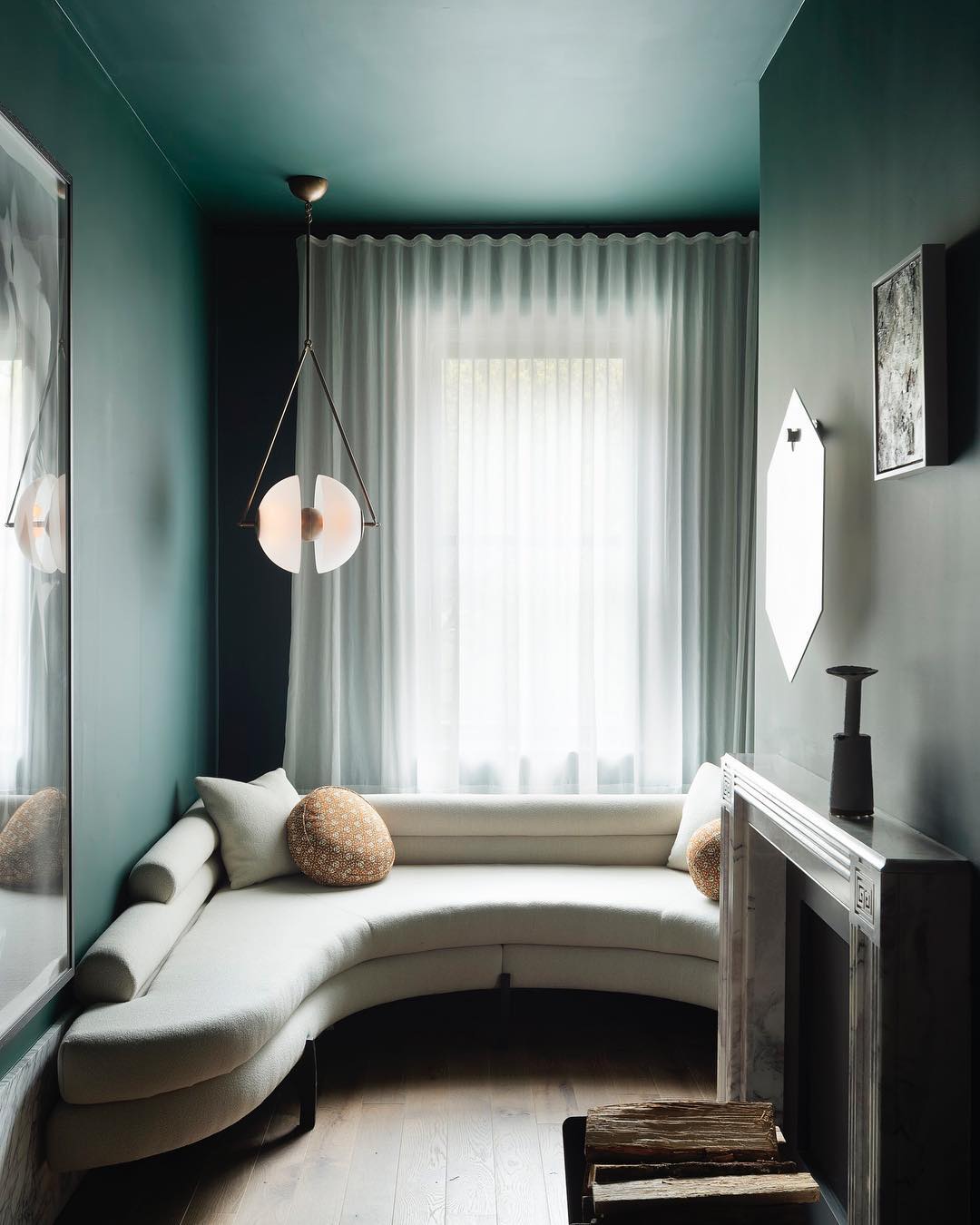
While we seemed to have reached a consensus that a snug is the best use for an awkward box room, few are so appealing as this space designed by Studio DB.
There's more than meets the eye in the elegant sweep of the sofa. A rectangular design wouldn't make effective use of the limited square footage, but the sofa dimensions of a standard L-shape would encroach too much. The answer then, is this custom piece, which utilises a precise silhouette to balance the room brilliantly. Note the straight back — here where space is tight, it makes sense for the sofa to hug the corners of the room. The round cushions help soften those sharper angles.
Much like those forest green walls and ceiling, the design brings a cocooning, indulgent feel to what could easily be an uninspiring small bedroom or home office, all without sacrificing on features like the fireplace.
6. Break up an open plan area
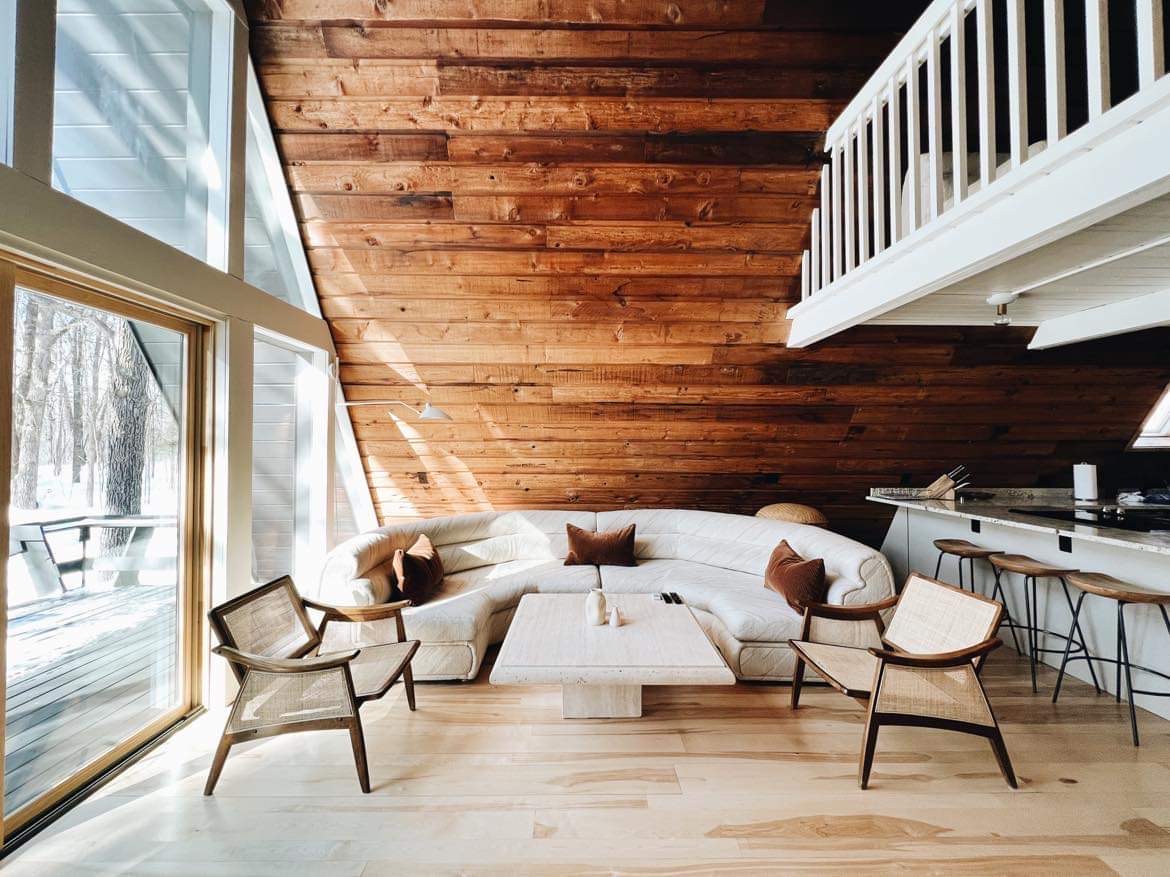
A louche vintage design was just the thing for Ashley and Jamie Hewitt, who have smartly used its curve to create a boundary between different zones at Lilla Norr, their Scandinavian A-frame house in the Northwoods of Minnesota.
"This vintage 1980s sofa breaks up the floorplan to define the rooms — where the open-plan kitchen ends and the living room begins," explains Jamie. "A modern sectional would've been too uniform with sharp 90-degree angles, whereas this sofa is more welcoming in the space with its U-shaped curve."
It certainly ticks some important boxes. "It allows for conversations in groups when seated, space for relaxation and stretching out for movie viewing, and it really offers the best seat in the house from any angle. The shape hugs the travertine stone coffee table, allowing access to a nearby surface."
7. Swap in for a hallway bench
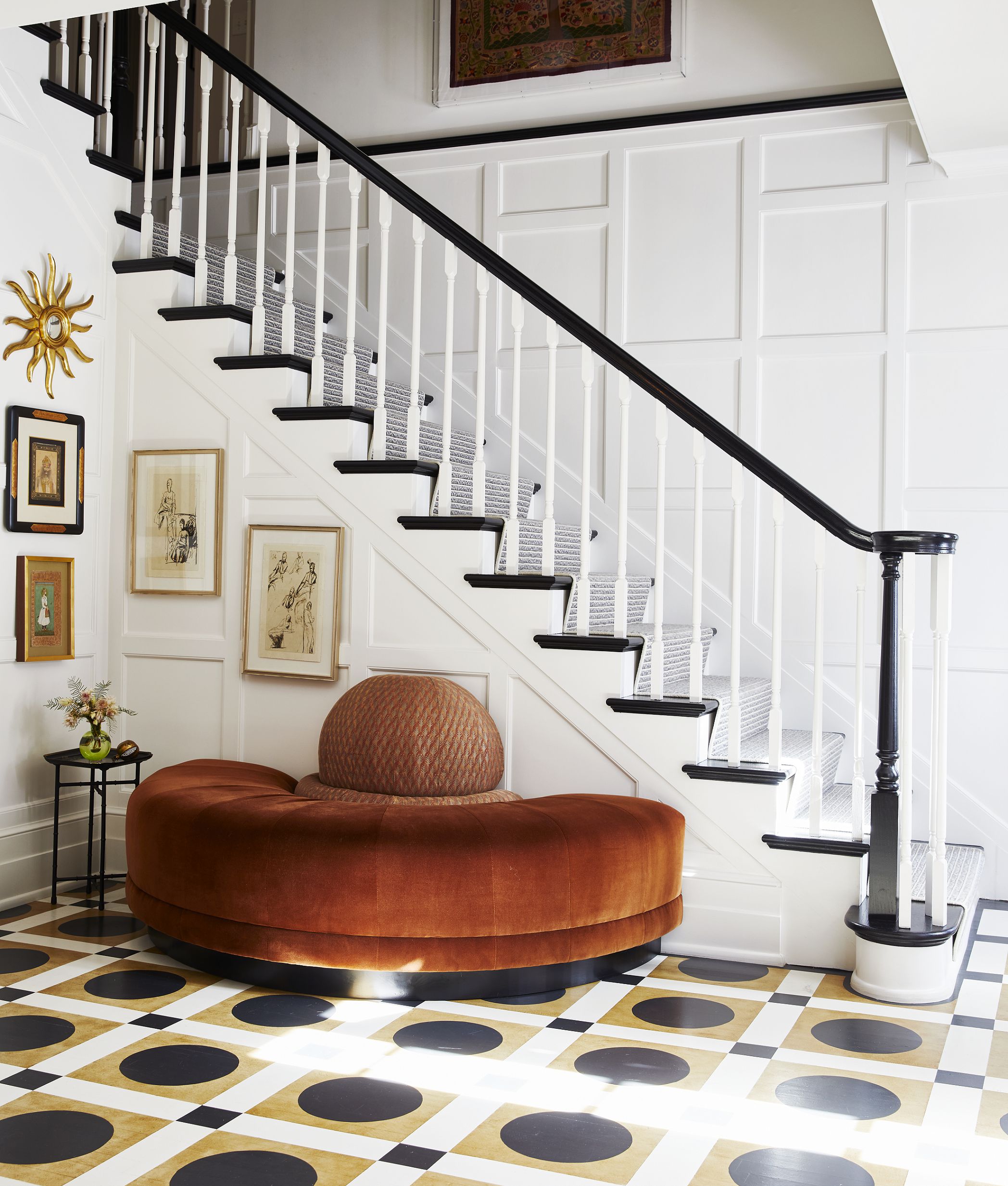
"Foyers can be so tricky and formal," laments Barrie Benson, the founder of her eponymous North Carolina-based interior design studio.
Her solution? A 1950s Roche Bobois couch, upholstered in a gorgeous burnt orange, which offers shoelace-tying practicality where a utilitarian bench wouldn't do justice to this Georgian home's entryway. "While this one certainly makes a stylish statement, it’s also a fun design element which reflects the personality of our fun-loving clients."
It's also about increasing linger time in an area of the home that's certainly earned it. "I hate the thought of not using a beautiful room for function. This semi-round is adjacent to the library lounge and is perfect for overflow seating."
8. Bring a curved sofa into a busy room
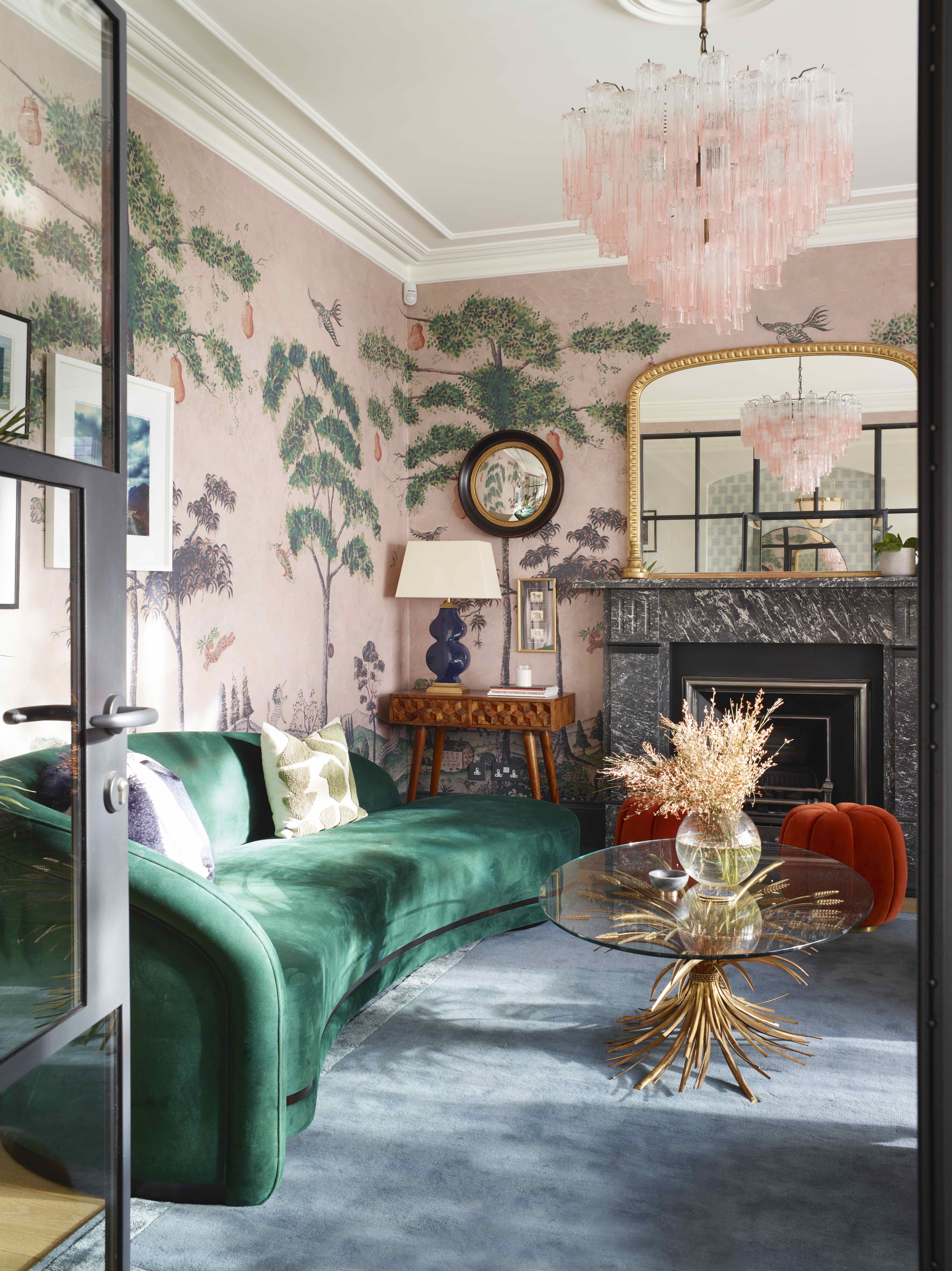
There are plenty of features that could fight for attention in this living room by Cat Dal Interiors, from the painterly wallpaper to the contemporary glass chandelier.
Instead, the curved sofa — even upholstered in a rich emerald green velvet — offsets some of the inherent drama by bringing a softer, more organic shape into a space where color and texture are hardly in short supply. Dressed with a couple of pillows, it looks right at home in this space which embodies eclectic style.
It's also a perfect foil to the sharper lines of the fireplace, area rug, and Crittall doors, which sequester this characterful sitting room from the entryway while allowing light through.
9. Improve flow in a high-traffic area
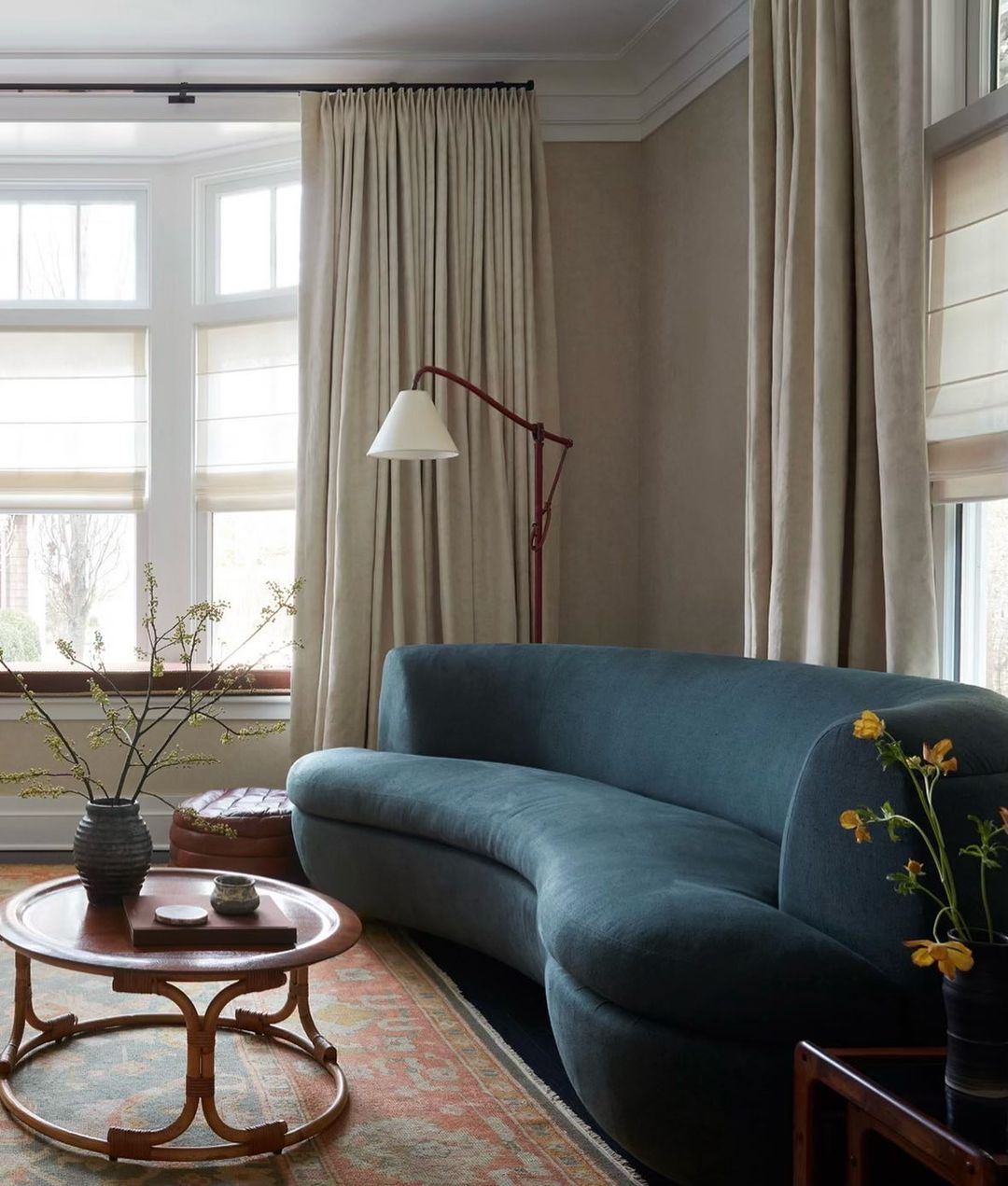
Anyone who has entered a room only to be abruptly faced with the back of a sofa or side of a wardrobe knows that a good layout is key to creating an elegant living room and comfortable home. An unexpected benefit of a curved sofa? No more skirting around a sharp corner (or mystery bruises at knee-height).
"A curved design helps a floorplan when you need to position it in a place that is passed around often," says Vicky Charles, the co-founder of New York interior design firm Charles & Co. "The lack of corners make it softer".
She's a big advocate for bringing a curved sofa into a bedroom, as organic lines lend themselves to comfort and restfulness. "It's kind of like a hug."
10. Use curves to create intimacy in a seating area

Tracing the curve of a circular rug, this slender sofa forms one side of a well-planned seating zone. "This classic Vladimir Kagan curved sofa has a delicate midcentury scale that was perfect for creating an intimate moment in the smaller half of the double living room," says interior designer Kimille Taylor, who describes it as a "super sexy" piece of furniture.
Where a standard sectional sofa would create an awkward intersection with the area rug and likely block a little more of the painting (spot the curvy shapes here too), the rounded design suggests a sense of visual continuity. The slimmer back creates a gentler stepped transition to the floor.
The sofa also had to do a decent job of drawing guests into this second seating area, says Taylor. "It creates a dynamic moment in the room that makes you go ooooh — I want to sit there!"
11. Conquer awkward corners and angles

"We were so excited when a client showed us a picture of a classic channel tufted sofa that she loved," says Tara Marshall, a principal architect and interior designer at Fort Architecture.
"The unusual angles of this space required us to think outside the box of the standard sofa layout. When dealing with awkward corners or large spaces you can really float this furniture piece like an island. Because there are no sharp edges, it doesn't necessarily feel like it has to align with walls and changing angles." It holds its own in this striking midcentury space, where slighter furniture might be swallowed up by that soaring wood-panelled ceiling.
"We love how it adds a very organic modern, softened form into a room full of angular shapes," she adds.
12. Place two sofas opposite each other

We've always said that those suspicious of rapid-fire trends should look to designers' own homes for inspiration — that's where you'll see tried-and-tested layouts that the experts are happy to live with every day.
So to the home of Dara Huang, where you'll find not one but two sinuous sofas in the living room. "A curved sofa just looks more elegant in the space," suggests the American architect and designer. "I especially like to put them facing each other. A symmetrical layout can make the room look more grounded.”
Is a curved sofa a good idea? This would definitely suggest that yes, it is. A naturally sociable set-up, it's a smart approach for larger living rooms, with greater wall space not given over to radiators, doorways, and fireplaces. Try a round coffee table that replicates the curve of the sofas to tie it all together.
FAQs
How do you use a curved sofa in a living room?
Knowing how to position and use a curved sofa in a living room in order to make the most of your space (and avoid wasting any) isn't always as straight forward as you may think.
Interior designer Marina Hanisch recommends leaning into the shape, and arranging a curved sofa in a semi-circle in your space, "as it enhances the cozy, inviting atmosphere and naturally encourages conversation."
She adds that "positioning it in the center of the room makes an even stronger design statement, allowing its shape to be appreciated from all angles."
What kind of living room works best with a curved sofa?
A curved sofa can be used in most living room layouts, but works particularly well in spacious rooms or open-concept layouts, says Marina. "They truly shine in areas where they can serve as a focal point, like a larger living room with ample negative space around them," she says. "This allows the sofa’s shape to be fully appreciated without feeling cramped."
But of course, you'll need to ensure you have the square footage for one. "Curved furniture takes up space a bit differently than a conventional sofa or sectional," adds Jamie Hewitt. "Make sure you measure the area you have to work with and simulate the shape beforehand to see if the space allows enough room for the piece to fit properly. Because the curves are seemingly more bulky, you may be surprised at how much larger it is once it's in."
What shape coffee table works best with a curved sofa?
Once you've committed to a curved sofa, the next step is to ensure the rest of your space works cohesively with its design. When it comes to selecting the best coffee table shape, Marina recommends a round or oval coffee table that will help accentuate the curves and create visual harmony. But you can also embrace the latest coffee table trends, too.
"For a more artistic look, consider an organic or irregular-shaped coffee table, which will also complement the sofa’s curves while adding a sculptural element to the design," she adds.







